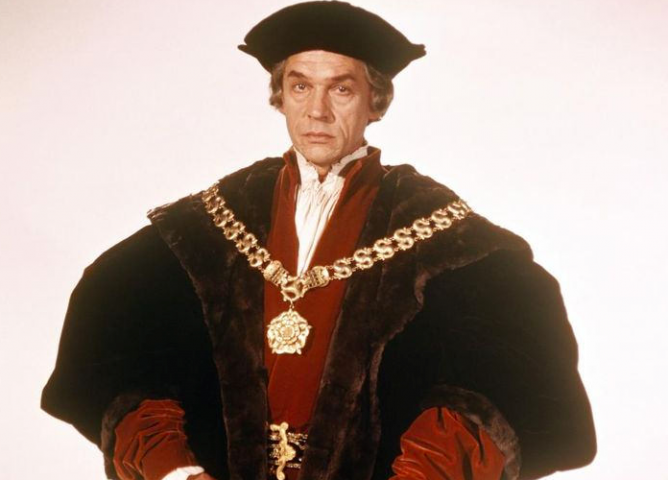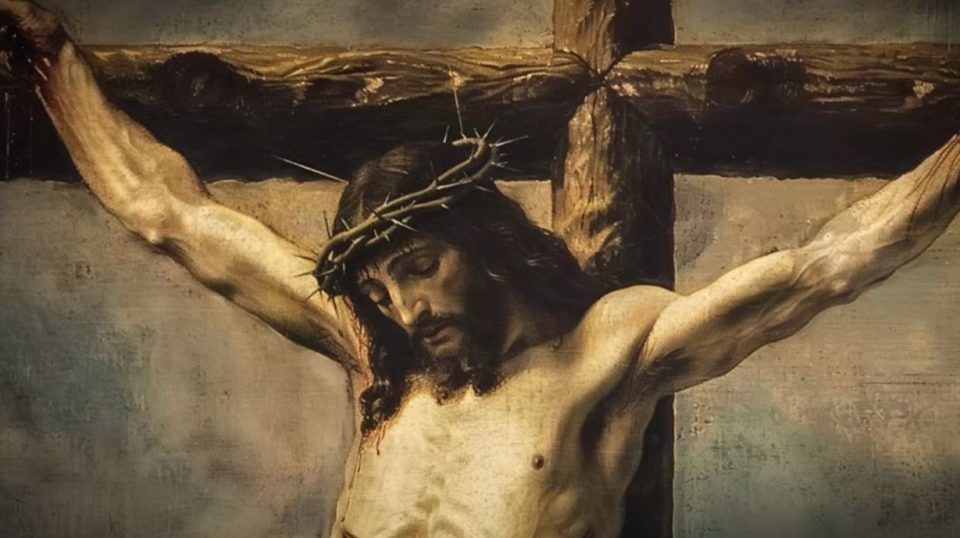Photo: (Actor) Paul Scofield as St Thomas More in the 1966 film A Man for all Seasons
The saint’s death was a heroic exercise in religious freedom
By Fr. Raymond de Souza, Catholic Herald, Saturday, 7 Jul 2018
Our colleague Michael Davis is “proud to call St Thomas More my patron, my hero, and my friend”. I salute that, though my devotion – both as a cleric, I suppose, and as a Cambridge man – tends towards the comparatively overlooked St John Fisher.
But I do not share Davis’s objection that the American bishops, as part of their annual campaign for religious liberty, are presenting Thomas More as some sort of early advocate of “tolerance” as it understood today.
“The United States Conference of Catholic Bishops has no right to re-appropriate his cause – not even for the sake of good PR,” writes Davis at catholicherald.co.uk. Presenting More as a martyr for anything other than “dedication to Catholic truth” is such a re-appropriation, he contends.
“We can’t pretend he died for an abstract principle like ‘religious liberty’,” writes Davis. “He would have considered the very concept dangerous to the political and spiritual health of his country. In his own dealings with heretics, he made no allowances for the firmness of their convictions. Aside from being historically specious, the ‘martyr of conscience’ reading also cheapens his death. … St Thomas was very clear about the cause for which he gave his life, and it wasn’t his own peace of mind. No: it was God. He died as a witness to the inviolability of the Sacraments and the supremacy of the Roman Pontiff.”
Thomas More was executed on July 6, 1535. At that time the liturgical calendar marked July 6 as the octave day for Ss Peter and Paul. In his last letter, written on July 5, More hopes for a speedy death, and notes that it is already the “[vigil] of St Peter”. No doubt it brought him consolation to know that he was executed for his loyalty to the Successor of St Peter on a feast of Peter himself.
So we can agree that St Thomas died for the divine constitution of the Church and the Petrine office, and for the indissolubility of marriage. Yet to understand him as a martyr for conscience does not diminish that.
Davis is in good company, to be sure. When the American bishops first proposed an annual campaign for religious liberty to begin with the feast of Fisher and More – now observed on June 22, the date of Fisher’s execution – the late Cardinal Francis George of Chicago made a similar point to that of Davis, namely that Thomas More was not really a martyr for the rights of conscience.
But St John Paul II took a different view when in October 2000 he declared St Thomas the patron saint of statesmen and politicians, beginning his apostolic letter with the words: “The life and martyrdom of St Thomas More … speaks to people everywhere of the inalienable dignity of the human conscience.
“What enlightened his conscience was the sense that man cannot be sundered from God, nor politics from morality,” the Holy Father continued. “And it was precisely in defence of the rights of conscience that the example of Thomas More shone brightly. It can be said that he demonstrated in a singular way the value of a moral conscience which is ‘the witness of God himself, whose voice and judgment penetrate the depths of man’s soul’ [Veritatis Splendor, 58], even if, in his actions against heretics, he reflected the limits of the culture of his time.”
Certainly in the 16th century our concept of religious liberty was not held by St Thomas More, nor anyone else. He did believe strongly in the liberty of the Church, from which religious liberty of individuals developed. The understanding of state and sovereign, amid the upheaval of the Reformation, was radically changing, and would continue to change as the Christian concept of the state as a sacral actor gave way to the modern state as a rival, not ally, of the Christian faith.
……
Every martyr dies for a particular issue. But fidelity to that issue to the point of shedding of the blood is also a heroic exercise of conscience. The same is true today when the rights of conscience are denied. The issue may be marriage, or the sanctity of life, or the sacramental seal of Confession – but it is also a violation of conscience.
One final thing. Davis cites the words of St Thomas at his execution: “I die the king’s faithful servant, but God’s first.” That’s the play A Man for All Seasons, not history. It’s a mistake I made until the recent exhibition on More in Washington revealed the truth – More said “and” not “but”. He died the king’s servant, and God’s. Just as he died for Catholic truth and conscience.
Fr Raymond J de Souza is a priest of the Archdiocese of Kingston, Ontario, and editor-in-chief of convivium.ca
This article first appeared in the July 6th 2018 issue of the Catholic Herald. To read the magazine in full, from anywhere in the world, go here







